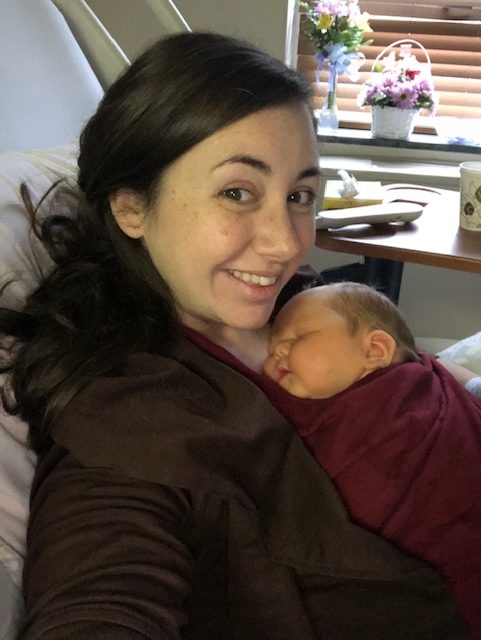 I remember the confusion, dare I say shock, I felt when I heard my Human Resources Director utter the word, “unpaid.” It was like a scene from a movie I replayed in my mind her mouth moving in slow motion, “UN….PAID…” I tilted my head slightly as animals do when they hear something peculiar and repeated back to her, “unpaid?” I asked for clarification several times before it sank in that I would need to make what seemed like an impossible decision. Would I sacrifice crucial bonding time with my newborn and cut short both physical and emotional healing time for myself or would I sacrifice a monthly paycheck, crucially needed, to provide for my new child?
I remember the confusion, dare I say shock, I felt when I heard my Human Resources Director utter the word, “unpaid.” It was like a scene from a movie I replayed in my mind her mouth moving in slow motion, “UN….PAID…” I tilted my head slightly as animals do when they hear something peculiar and repeated back to her, “unpaid?” I asked for clarification several times before it sank in that I would need to make what seemed like an impossible decision. Would I sacrifice crucial bonding time with my newborn and cut short both physical and emotional healing time for myself or would I sacrifice a monthly paycheck, crucially needed, to provide for my new child?
I began working at a small to medium sized community college in 2009 as an adjunct instructor. I was offered a full-time English faculty position as soon as I graduated with my Master’s degree in 2010. I was ecstatic. I would be able to fill my days doing what I love – teaching. I believed in the power of an education and I was ready to share it with the world! I threw myself into my profession, teaching six courses per semester and jumping head first into institutional initiatives. It wasn’t unusual to work 60 hour weeks serving my students and my institution. I would teach during the day, serve on committees and strategize initiatives in the evening, and grade essays on the weekends. It wasn’t unusual to have female colleagues, many already with children, doing the same beside me. I LOVED my career.
My husband and I received the news that we would be blessed with a beautiful baby boy in June of 2014. I had been full-time faculty, fully involved with the campus culture, for four full years. I had rarely taken a sick day in those four years and I felt confident that I would be able to balance being a professional and being a new mom. As I left the Human Resources department the day I was told “unpaid,” I felt myself getting warmer and I felt the salty tears swell up in my eyes.
Here were the facts – I had the right to twelve weeks of FMLA, the Family and Medical Leave Act which ensured my position at the College would be held until my return; however, these twelve weeks would be unpaid. I could elect to take some or all of the leave I’d accrued.
My husband and I began calculating. How long could we survive on one paycheck? By the grace of God, we were expecting in the summer so I wouldn’t need to begin my unpaid leave until August. After much discussion, we felt it best that I should exhaust my earned sick days (which were paid) and take approximately eight weeks of the leave (which would be unpaid). The stress of knowing that I would soon become a new mom in addition to facing two months of no pay was suffocating.
We were lucky – my delivery went as planned and I delivered a healthy baby boy that June – no NICU, no medical issues, no post-partum depression for me. As planned, I returned back to work in mid-October and tried to balance the career I loved dearly and a blooming family I loved even more.
What we could have never anticipated is that at the age of 29, that same year, my husband would be diagnosed with Hodgkin’s Lymphoma, a rare blood cancer. He would endure excruciating chemotherapy treatments every other Monday for five months. Our journey through cancer is for another time and article, but there I was – a new mom, a caregiver to a cancer patient, and now, our sole income provider – fully knowing that my options were to take unpaid FMLA or to survive what seemed like an impossible situation.
The United States has struggled to progress in its policies concerning paid parental leave even though numerous studies have shown a multitude of benefits of doing so. The article, “Paid Maternity Leave in the United States: Associations with Maternal and Infant Health,” states, “Women who took paid maternity leave experience a 47% decrease in the odds of re-hospitalizing their infants and a 51% decrease in the odds of being re-hospitalized themselves at 21 months postpartum, compared to women taking unpaid or no leave.” In addition, “They also had 1.8 times the odds of doing well with exercise and stress management compared to women taking only unpaid leave.”
While the physical health of the mother and the baby are often monitored by obstetricians and pediatricians, the mental health of the mother may not receive the proper care. Another study notes, “mental health professionals have little advice for mothers about the normal challenges of working while being responsible for an infant or a young child, or while dealing with clinically significant problems of mood, anxiety, or cognitive efficiency, all of which may be compromised in the postpartum period.” The research article, “Risks and Rewards of Returning to Work Postpartum,” notes a concept called “spillover” – an overflowing workload for the mother at work and at home. The article states: “An example of job-to-home spillover would be the necessity of a woman bringing work home, which takes away from time that a mother could spend with her new baby; this also deprives her of a sufficient break from work. A woman who is experiencing home-to-job spillover may have to leave work unexpectedly for family-related reasons, reducing her productivity.”.
Research study after research study demonstrates that women adapt better to motherhood when they have time to do so – and that makes perfect sense. Motherhood is a life-changing, life-altering, transformational experience. When women are afforded the time and resources to transition from self-provider to family-provider it ensures the creation of not only a healthier home environment, but also a healthier work environment.
Jennifer F. Boyle was born and raised in the foothills of North Carolina. She now lives in Lexington, NC and is a lover of rhetoric, western style liver-mush, education, BBQ, and fully embracing her mountain mama self to two little boys and one spirited husband.


There are no comments
Add yours